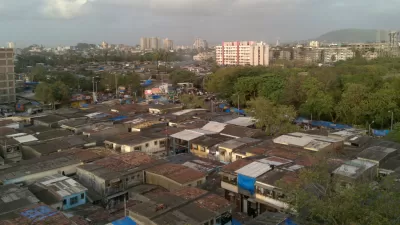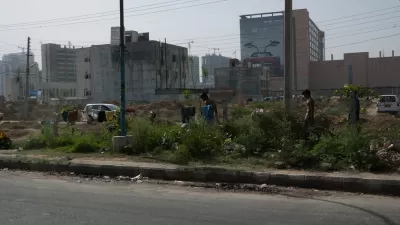Slums have garnered some positive attention lately, from academics (Teddy Cruz) to royalty (Prince Charles). This article looks at just what it is we can learn from them, as well as the challenges that face legitimizing the world's shantytowns.
"To be sure, there is something unseemly in privileged people rhapsodizing about such places. Prince Charles, for all his praise, does not appear poised to move to a shack in Dharavi. Identifying the positive aspects of poverty risks glorifying it or rationalizing it. Moreover, some of the qualities extolled by analysts are direct results of deprivation. Low resource consumption may be good for the earth, but it is not the residents' choice. Most proponents of this thinking agree that it's crucial to address the conflict between improving standards of living and preserving the benefits of shantytowns.
But given the reality that poverty exists and seems unlikely to disappear soon, squatter cities can also be seen as a remarkably successful response to adversity - more successful, in fact, than the alternatives governments have tried to devise over the years. They also represent the future. An estimated 1 billion people now live in them, a number that is projected to double by 2030. The global urban population recently exceeded the rural for the first time, and the majority of that growth has occurred in slums. According to Stewart Brand, founder of the Long Now Foundation and author of the forthcoming book 'Whole Earth Discipline,' which covers these issues, 'It's a clear-eyed, direct view we're calling for - neither romanticizing squatter cities or regarding them as a pestilence. These things are more solution than problem.'"
FULL STORY: Learning from slums

Maui's Vacation Rental Debate Turns Ugly
Verbal attacks, misinformation campaigns and fistfights plague a high-stakes debate to convert thousands of vacation rentals into long-term housing.

Planetizen Federal Action Tracker
A weekly monitor of how Trump’s orders and actions are impacting planners and planning in America.

Chicago’s Ghost Rails
Just beneath the surface of the modern city lie the remnants of its expansive early 20th-century streetcar system.

Bend, Oregon Zoning Reforms Prioritize Small-Scale Housing
The city altered its zoning code to allow multi-family housing and eliminated parking mandates citywide.

Amtrak Cutting Jobs, Funding to High-Speed Rail
The agency plans to cut 10 percent of its workforce and has confirmed it will not fund new high-speed rail projects.

LA Denies Basic Services to Unhoused Residents
The city has repeatedly failed to respond to requests for trash pickup at encampment sites, and eliminated a program that provided mobile showers and toilets.
Urban Design for Planners 1: Software Tools
This six-course series explores essential urban design concepts using open source software and equips planners with the tools they need to participate fully in the urban design process.
Planning for Universal Design
Learn the tools for implementing Universal Design in planning regulations.
planning NEXT
Appalachian Highlands Housing Partners
Mpact (founded as Rail~Volution)
City of Camden Redevelopment Agency
City of Astoria
City of Portland
City of Laramie





























